Court Marriage in Karachi, Pakistan | Court Marriage Process
Court Marriage in Karachi, Pakistan – A Legal & Hassle-Free Court Marriage Process
Court marriage in Pakistan has become an increasingly popular choice for couples who prefer a legally recognized, efficient, and private way to solemnize their marriage. It offers a lawful alternative to traditional wedding ceremonies, ensuring that the union is officially registered and recognized under Pakistani law. Whether in Karachi, Lahore, Islamabad, or Rawalpindi, court marriage offers couples a smooth, cost-effective, and dignified way to start their married life.
Understanding Court Marriage in Pakistan
A court marriage in Pakistan is conducted under the Marriage and Family Laws of Pakistan, where two consenting adults choose to formalize their marriage before a registrar or authorized lawyer. The process is guided by legal principles and Shariah compliance, making it valid both in the eyes of the law and religion.
Unlike traditional weddings that involve extensive arrangements, a court marriage focuses solely on the legal and procedural formalities, including documentation, verification, registration, and issuance of the official Nikah Nama (marriage certificate).
Why Court Marriage is Preferred in Pakistan
-
Legal Authenticity – Court marriages are legally binding and officially recognized throughout Pakistan and abroad.
-
Privacy & Confidentiality – Ideal for couples seeking discretion and minimal public exposure.
-
Quick & Efficient – The entire process can be completed within a few hours once documents are ready.
-
Budget-Friendly – A cost-effective alternative to lavish ceremonies.
-
International Acceptance – Court marriages registered in Pakistan are recognized by embassies and immigration authorities worldwide.
Court Marriage Procedure in Pakistan
The process of court marriage in Pakistan generally includes:
-
Verification of CNICs and age
-
Preparation of affidavits of consent and marital status
-
Nikah solemnization by a qualified Nikah Khawan
-
Signing of Nikah Nama
-
Registration and issuance of the official marriage certificate
Professional legal assistance ensures every step is conducted in compliance with Pakistani law and Islamic principles.
Court Marriage Fee in Pakistan – Transparent and Affordable
At Right Law Associates (Pvt) Limited, we believe in providing clear and affordable pricing for court marriage services in Pakistan. Our legal team provides professional guidance, document handling, and complete confidentiality at every stage.
Court Marriage Fee Structure in Pakistan
| Service | Description | Estimated Cost (PKR) |
|---|---|---|
| Legal Consultation | Initial case review and eligibility check by senior lawyers. | Free (Included in Package) |
| Documentation & Affidavits | Preparation of CNIC copies, free-will affidavits, and marital declarations. | 5,000 – 8,000 |
| Nikah Khawan Service | Qualified Nikah Khawan conducts Nikah in compliance with Islamic law. | 5,000 – 7,000 |
| Court Registration | Legal registration of marriage before the court and registrar. | 7,000 – 10,000 |
| Issuance of Nikah Nama & Certificate | Delivery of the official Nikah Nama and registered certificate. | 5,000 – 7,000 |
| Optional Add-ons | Embassy attestation, translation, or foreign verification (if needed). | 5,000 – 10,000 |
💰 Total Estimated Fee: PKR 25,000 – PKR 35,000 (depending on documentation, location, and optional services).
Court Marriage in Pakistan – Legally Recognized and Shariah-Compliant
Every court marriage in Pakistan conducted through Right Law Associates (Pvt) Limited is both legally valid and Shariah-compliant. Our expert family and court marriage lawyers ensure that all legal formalities are completed accurately, the marriage is registered appropriately, and Pakistani authorities officially recognize the Nikah Nama.
Start Your Court Marriage Process Today
If you’re planning a court marriage in Pakistan, let Right Law Associates handle everything — from legal paperwork and registrar coordination to Nikah solemnization and certificate issuance.
📞 Contact Us:
Call +92 336 37 47 047 or visit our offices in Karachi, Lahore, or Islamabad for a free consultation.
Start your new chapter with confidence, legality, and peace of mind through Right Law Associates (Pvt) Limited — your trusted partner for court marriage in Pakistan.
Court Marriages are Conducted Without Family Involvement
Court marriages are often conducted without family involvement, but legal procedures must be followed to ensure validity. Proper documentation and statements are crucial to prevent future legal issues. The importance of involving families in marriages is emphasized, yet many couples choose to marry without their families’ knowledge. This can lead to legal complications later on.
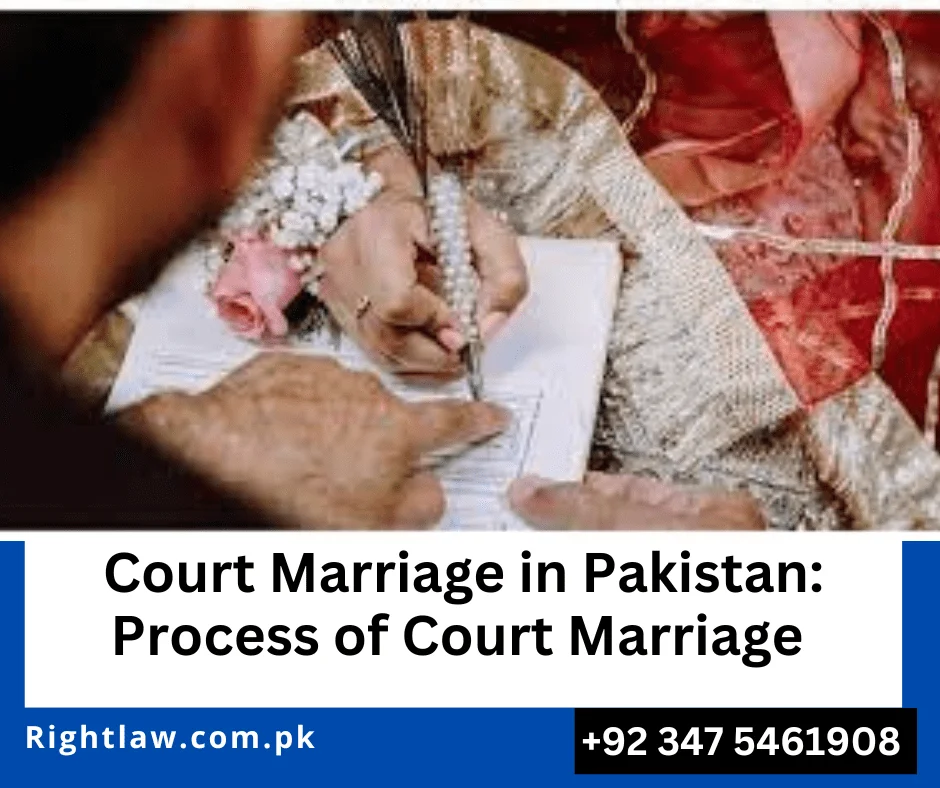
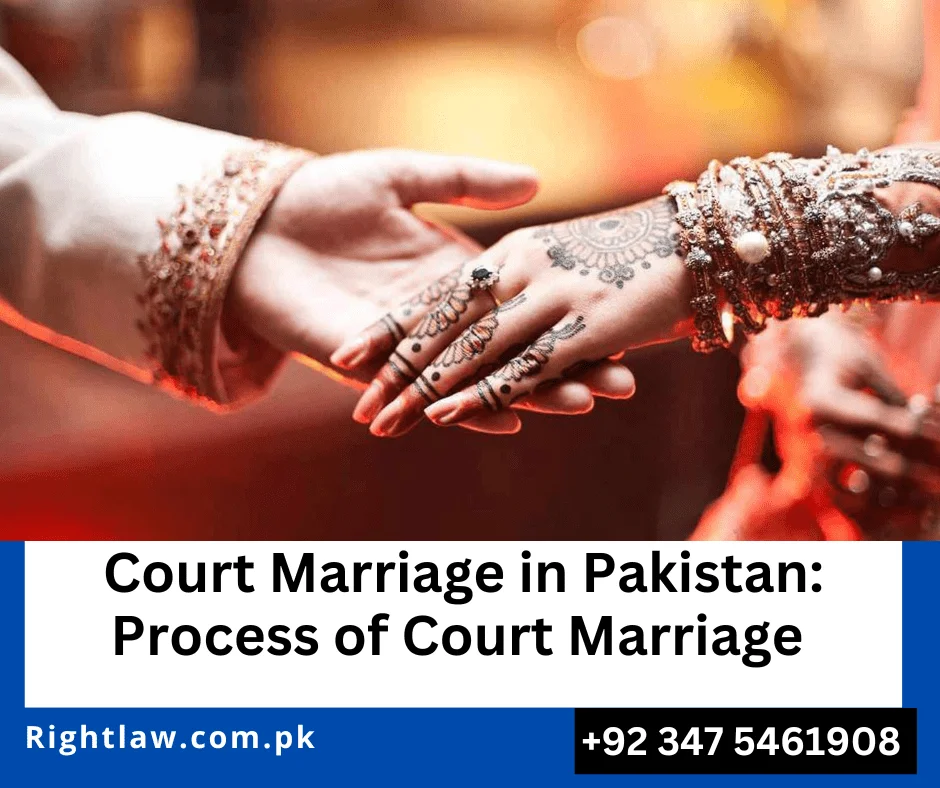
Steps For Court Marriage in Pakistan
The steps for court marriage in Pakistan involve several legal and procedural requirements. Here’s a general outline:
- Age Requirement: Ensure both parties meet the legal age for marriage—18 years for both males and females.
- Prepare Necessary Documents: Gather the required documents, which typically include:
- National Identity Cards (CNIC) of both parties.
- 6 Passport-sized photographs of both parties.
- In some cases, proof of residency.
- A certificate of no objection or a declaration (if previously married).
- Visit a family lawyer: Both parties must visit the lawyer’s office for the Nikah and marriage registration. In most cases, this is a Family Law Expert.
- Witnesses: Bring two witnesses to the marriage. Their CNICs will likely be required as well.
- Marriage Certificate: After the Shara’i Nikah, the Nikah Registrar will issue a marriage contract (Nikah Nama), which serves as the legal proof of marriage.
- Registration: Register the marriage with the relevant authority (like the Union Council) to obtain a formal marriage registration certificate.
- Post-Marriage Documents: It’s advisable to keep multiple copies of all documents related to the marriage, including the marriage certificate.
Important Considerations:
- Notification to Families: If there’s a concern about family objections, consider discussing this beforehand.
- Legal Advice: It can be helpful to consult with a lawyer experienced in family law to navigate the process smoothly.
- Securing Rights: Ensure to understand your rights and responsibilities as per the Family Laws of Pakistan.
These steps may vary slightly based on local jurisdiction and specific circumstances, so it’s advisable to confirm with a legal professional.
Court marriage in Pakistan involves several steps to ensure that the marriage complies with legal requirements. Here is a general outline of the steps involved:
- Eligibility Check:
- Both parties must be of legal age: the couple must be 18 year old.
- Both parties must be willing and consenting to the marriage.
- Document Preparation:
- CNIC/B-Form: Copies of the Computerized National Identity Card (CNIC) or B-Form for both parties.
- Photographs: Passport-sized photographs of both the bride and the groom.
- Witnesses: CNIC copies of two male witnesses (or one male and two female witnesses).
- Engage Legal Services:
- Although not mandatory, it is advisable to hire a legal expert or a lawyer who specializes in family law to guide you through the process.
- Appear before a Magistrate/Marriage Registrar:
- Both parties must be present at our law office or marriage registrar along with their witnesses.
- The marriage registrar will examine the documents, verify the identity of both parties and ensure that both parties are willingly entering into the marriage.
- Nikah Ceremony:
- A Nikah Khawan (a person authorized to conduct the marriage) will conduct the Nikah (marriage) ceremony in our law office. During the Nikah:
- Ijab-o-Qabool: The groom and bride verbally accept each other in the presence of witnesses.
- Nikah nama: The marriage contract (Nikah nama) is filled out, and signed by both parties, witnesses, and the Nikah Khawan.
- A Nikah Khawan (a person authorized to conduct the marriage) will conduct the Nikah (marriage) ceremony in our law office. During the Nikah:
- Registration of Marriage:
- The marriage is then registered with the local Union Council or the relevant authority. An official copy of the Nikah nama is issued to the couple.
- Statement Under Section 200 (for Some Cases):
- In case of a court marriage where the families are not informed, it is advisable to record statements under Section 200 of the Code of Criminal Procedure. This can serve as additional legal protection in case of any disputes or objections later.
- Obtain Marriage Certificate:
- After the marriage is registered, you can apply for a marriage certificate known as the “Marriage Registration Certificate” issued by the Union Council office.
- Legal Review (Optional):
- It is recommended to get your documents be reviewed by our legal professional to ensure all legal obligations are fulfilled.
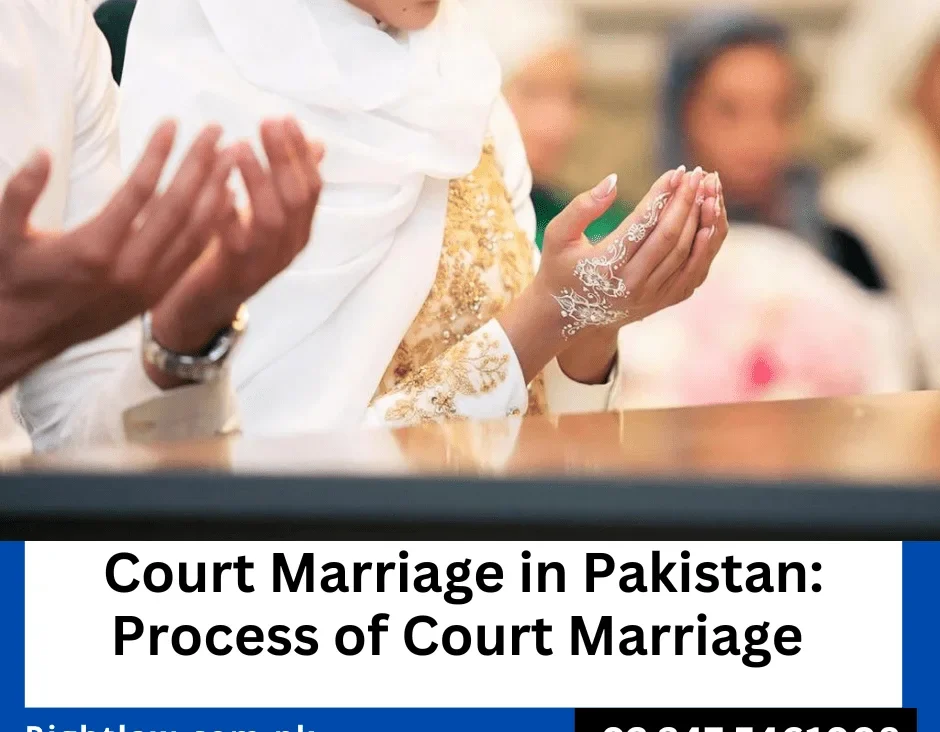
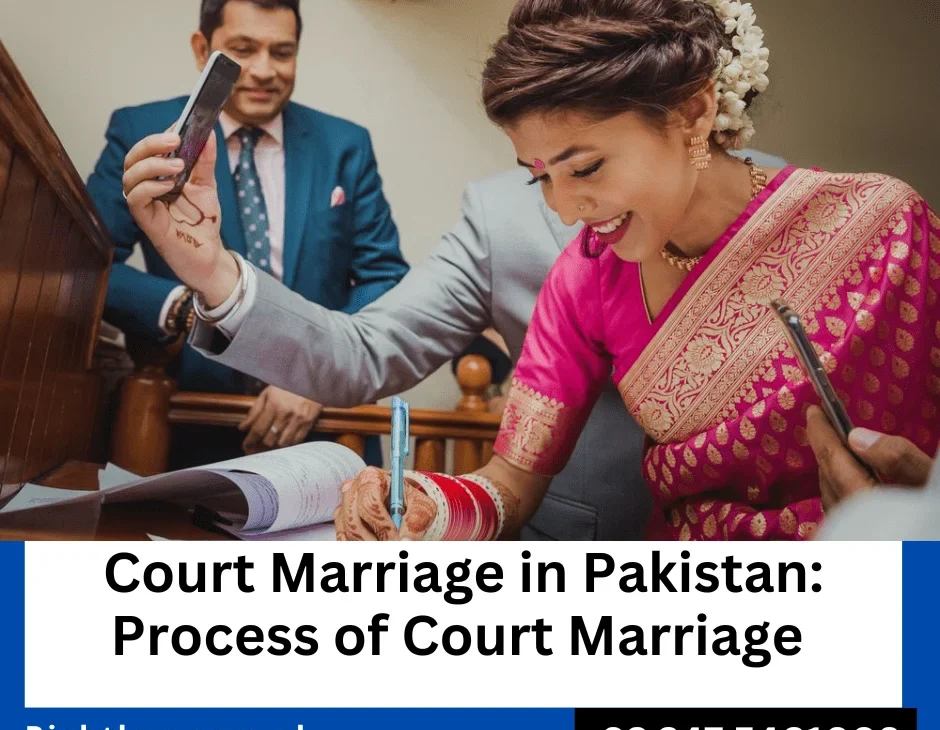
Broad Overview of the Court Marriage in Pakistan
These steps provide a broad overview of the court marriage process in Pakistan. It is essential to consult with a legal expert or a family law attorney to ensure that all local legal requirements are met and to avoid any potential issues.
Court marriage, also known as civil marriage, is a legal process in Pakistan for couples to get married without traditional religious ceremonies.
Consult with Our Family Lawyers For Free
Note that the exact process may vary slightly depending on the specific location and local regulations. It’s advisable to consult with our family lawyer, free of cost, or the relevant court for the most up-to-date and location-specific information.
The procedure for a court marriage in Pakistan involves several steps. Here’s a detailed guide outlining each phase of the process:
Looking for Legal Service With Global Quality?
1. Age Verification
Both parties must be of legal age to marry. The legal age for marriage is 18 years for females and 18 years for males.
2. Obtain Identification Documents
Both individuals must have valid identification documents. This includes:
- Computerized National Identity Cards (CNICs) or B-forms if CNICs are not yet issued.
- Copies of these identification documents.
3. Obtain Free Will Affidavits
Both parties are required to submit affidavits declaring their willingness and consent to marry each other without any coercion or pressure. These affidavits are known as “Free Will Affidavits.”
4. Appoint a Lawyer
Engage a lawyer who specializes in family law and court marriages. The lawyer will assist in ensuring that all legal requirements are met and will streamline the process.
5. Prepare Nikah Nama and Marriage Certificate
A Nikah Nama and a marriage certificate must be prepared. This document includes details such as the names of the bride and groom, their fathers’ names, CNIC numbers, and addresses.
6. Visit the Court
Both parties, along with their witnesses, must visit the marriage registrar. At least two male witnesses (or one male and two female witnesses) are required to witness the marriage.
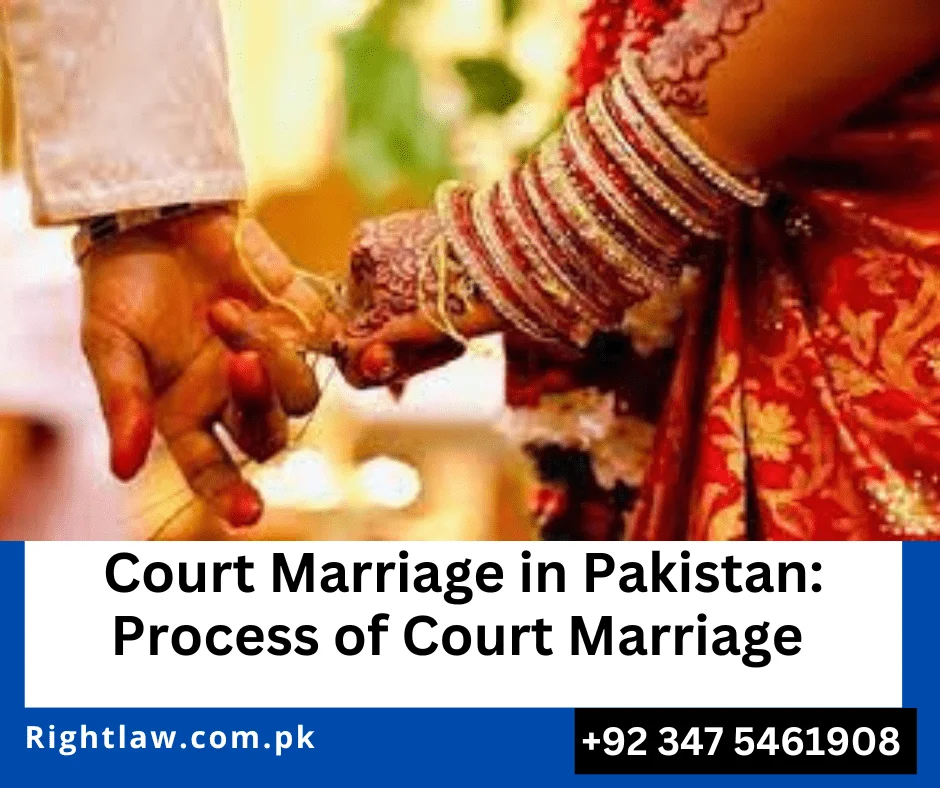
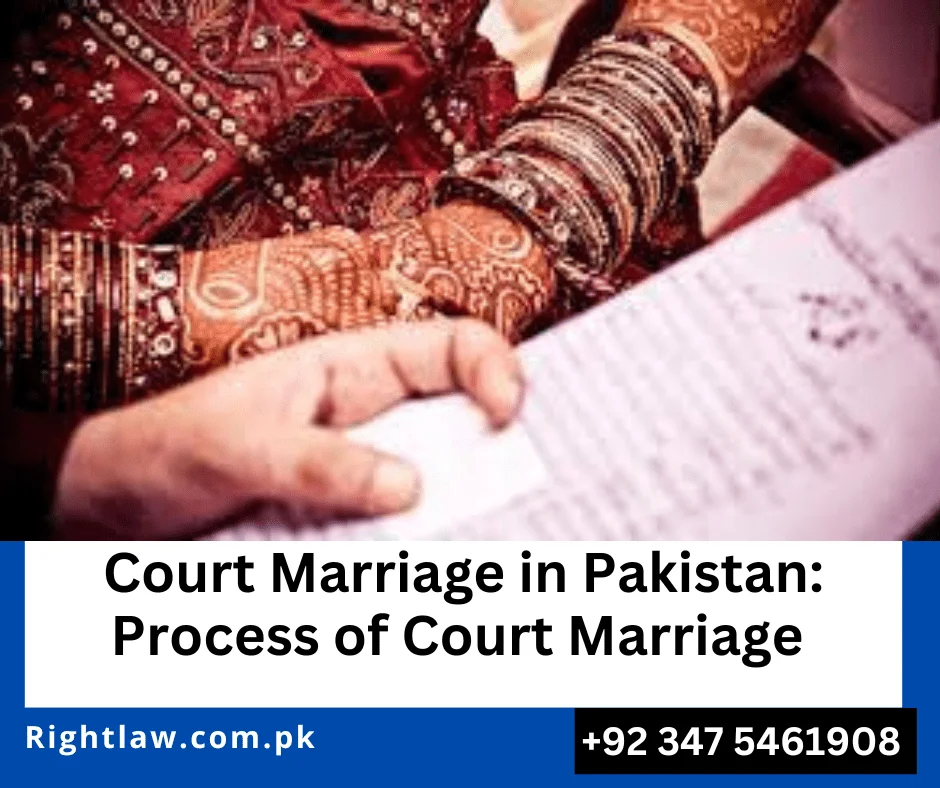
7. Marriage Solemnization
The marriage is solemnized by a Nikah Registrar (licensed marriage officiant). The Nikah Registrar will lead the marriage ceremony and ensure that all legal formalities are followed.
8. Signing of Nikah Nama
Post solemnization, the Nikah Nama must be duly signed by the bride and groom, their witnesses, and the Nikah Registrar.
9. Register the Marriage
The registered Nikah Nama needs to be submitted to the relevant Union Council or local government body for official registration. This registration validates and legalizes the marriage.
10. Obtain Certified Copies
Once the marriage is officially registered, obtain copies of the Nikah Nama for record-keeping purposes and any future legal requirements.
11. Recording of Statements under Section 200
In some cases, especially when the marriage is conducted without family consent, both parties might need to record their statements before a magistrate under Section 200 of the Criminal Procedure Code (CrPC). This step is crucial to avoid any potential legal complications or false allegations of abduction.
Potential Challenges
While the procedure seems straightforward, the following challenges might arise:
- Family Opposition: Lack of family consent can lead to legal troubles and personal conflicts.
- False Allegations: In the absence of family approval, there could be false allegations of kidnapping or coercion.
- Legal Support: Complex legal issues may require ongoing support from our competent lawyers.
- Documentation Errors: Errors in documentation can lead to delays or nullification of the marriage.
Court Marriage in Pakistan is a Legal Process
Court marriage in Pakistan is a legal process that requires adherence to specific steps and the completion of necessary legal formalities. Engaging a knowledgeable lawyer and ensuring the authenticity of documents can help smoothen the process and avoid legal complications.
Right Law Associates – Leading Law Firm of the World-Famous QANOON GROUP
Right Law Associates, a distinguished division of the globally renowned QANOON GROUP, stands as the largest and most reputable law firm in Pakistan. With a legacy of excellence and a commitment to providing unparalleled legal services, Right Law Associates has earned a stellar reputation for its expertise, dedication, and client-centered approach.
Looking for Legal Service With Global Quality?
Comprehensive Court Marriage Services in Pakistan
At Right Law Associates, we specialize in providing comprehensive court marriage services across Pakistan’s major cities, including Karachi, Lahore, Islamabad, and Rawalpindi. Our team of experienced legal professionals is dedicated to ensuring that your court marriage process is seamless, efficient, and stress-free.
Court Marriage Services in Karachi
Karachi, being the largest city of Pakistan, witnesses a high demand for court marriage services. Our team at Right Law Associates in Karachi is well-versed in handling all aspects of court marriage, from documentation to legal formalities. We ensure that your court marriage in Karachi is conducted with utmost professionalism and confidentiality.
Court Marriage Services in Lahore
In Lahore, the cultural heart of Pakistan, Right Law Associates offers expert court marriage services. Our lawyers in Lahore are proficient in managing the legal requirements for court marriages, ensuring that every step is executed with precision and care. Choose Right Law Associates for a hassle-free court marriage experience in Lahore.
Court Marriage Services in Islamabad
As the capital city of Pakistan, Islamabad presents a unique set of legal requirements for court marriages. Our team in Islamabad is adept at navigating these complexities, providing you with reliable and efficient court marriage services. Trust Right Law Associates to handle your court marriage in Islamabad with expertise and professionalism.
Court Marriage Services in Rawalpindi
Rawalpindi, a city known for its rich history and vibrant culture, also demands specialized court marriage services. Right Law Associates in Rawalpindi is committed to delivering exceptional legal support for your court marriage. Our lawyers ensure that all legalities are meticulously handled, making your court marriage process in Rawalpindi smooth and straightforward.
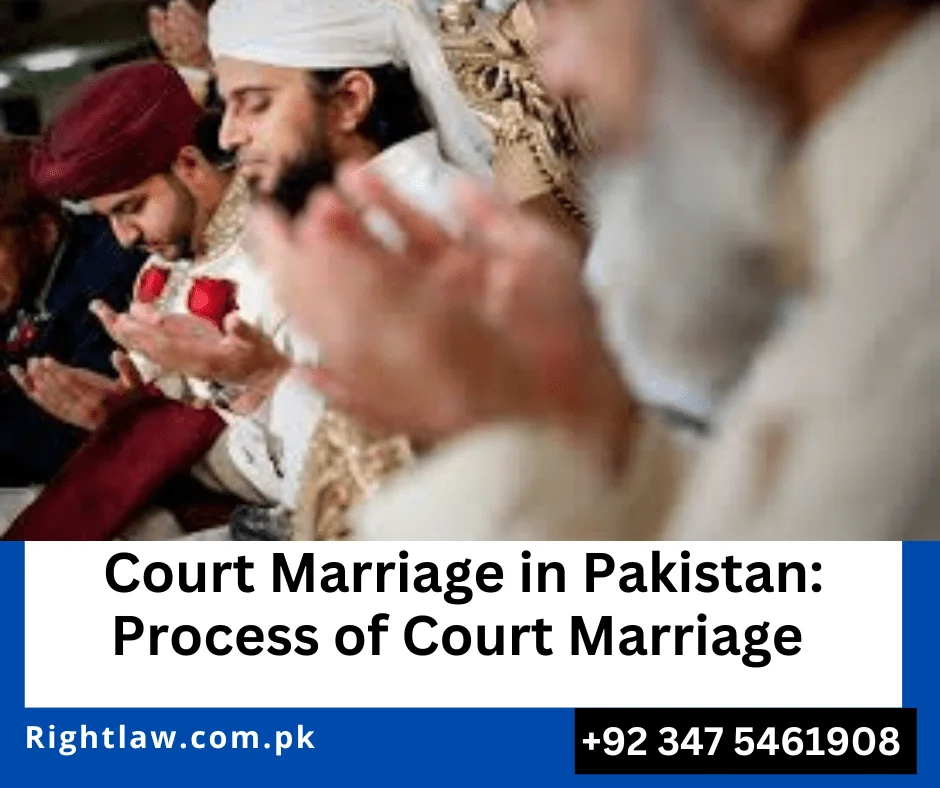
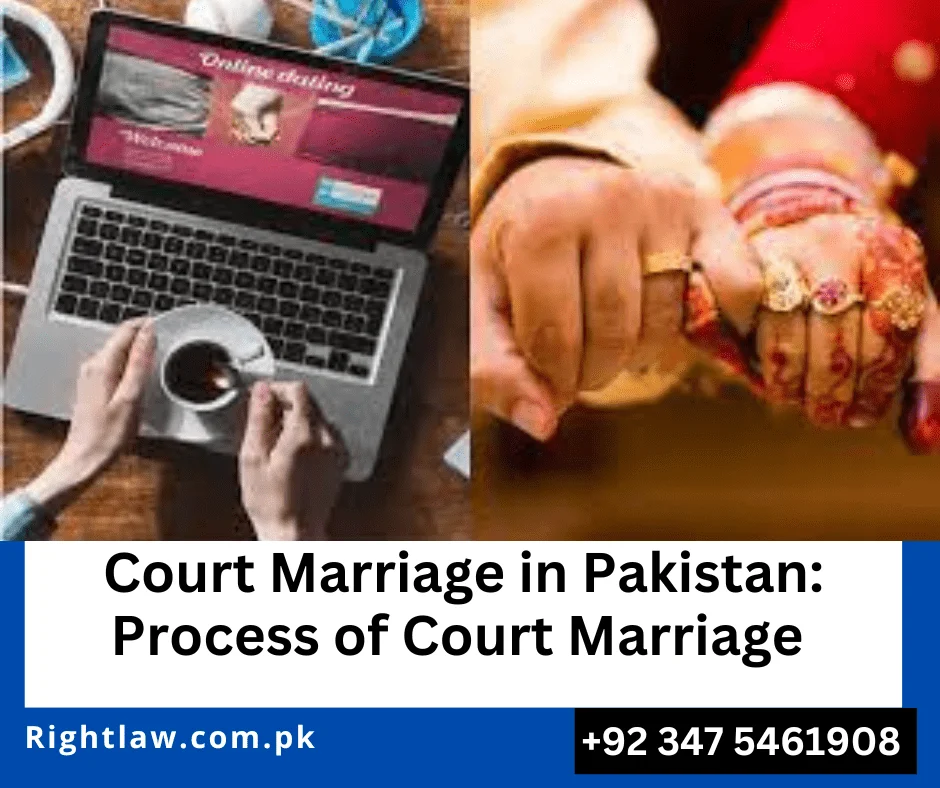
Why Choose the Right Law Associates for Court Marriage in Pakistan?
Right Law Associates offers unparalleled court marriage services across Karachi, Lahore, Islamabad, and Rawalpindi. Here are a few reasons why you should choose us:
- Experienced Legal Professionals: Our team comprises seasoned lawyers who are experts in court marriage laws in Pakistan.
- Comprehensive Legal Support: From initial consultation to the finalization of your court marriage, we provide end-to-end legal assistance.
- Confidentiality and Privacy: We prioritize your privacy and ensure that all legal matters are handled with the utmost confidentiality.
- Seamless Process: Our streamlined process ensures that your court marriage is conducted efficiently, without any unnecessary delays or complications.
Contact Us for a Free Consultation
At Right Law Associates, we understand that court marriage is a significant decision in your life. We are here to provide you with the best legal support and guidance. Contact us today for a free consultation regarding your court marriage in Karachi, Lahore, Islamabad, or Rawalpindi. Let our expert team help you navigate the legalities and ensure a smooth and successful court marriage process in Pakistan.
For more information or to schedule your free consultation, visit our website or call us at [Your Contact Number]. Trust Right Law Associates, the largest law firm of the world-famous QANOON GROUP, to handle your court marriage with professionalism and care.
